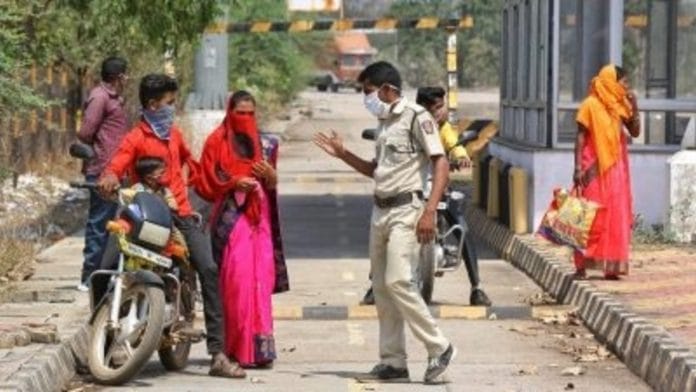New Delhi: Nearly 55 per cent Indians feared getting beaten up by the police during lockdown last year, and the police action in that period was “invariably harsher on the already disadvantaged groups such as the poor, Dalits, tribals and Muslims”, a new report on policing in India said.
Titled Status of Policing in India Report 2020-21: Policing in the Covid-19 Pandemic, the report has been prepared by the Centre for the Study of Developing Societies (CSDS) in collaboration with Common Cause India, a Delhi based non-profit.
It is based on a survey of citizens and police personnel across tier-1,2 and 3 cities in 10 states and union territories. However, exact details of the survey pool weren’t available. The data was collected during October-November 2020.
“During the lockdown, use of force by the police and police brutality were commonly reported, even in cases of minor infringement of the strict lockdown rules. This inevitably led to confrontations between the police and the people,” said the report, which was released Monday.
It said 57 per cent people feared imposition of fines and penalties during the lockdown.
Moreover, the poor, Dalits, tribals and Muslims “faced greater disadvantages generally due to the lockdown, having difficulty accessing essentials such as food or ration”.
“…they were also more likely to be evicted as tenants. Worsening their woes was the discrimination they faced by the police during this period, as is evident from the findings,” the report said.
However, the report noted that the police’s image improved after the lockdown, and the level of trust has also increased.
“This is a reflection on how the police have been behaving in the past. Whether pandemic or normal times, there is no great difference,” former home secretary G.K. Pillai said at the report launch.
Also read: ‘Don’t want to live like a victim’ — How a women’s adalat in UP is empowering survivors of abuse
Major findings
Those belonging to the lower class of the society, based on income level, were more scared of the police, including that of physical violence during the lockdown as compared to other classes, the report said.
Moreover, 49 per cent police personnel reported frequent use of force against migrant labourers and 33 per cent used force to prevent those trying to enter shelters.
While 59 per cent migrant workers and 61 per cent relief workers were satisfied with the police during the lockdown, respectively, both groups were of the opinion that “excessive force” was used.
The report also noted that over “one-third of the aid workers believe that police behaved very badly with the homeless people, slum dwellers and migrant workers during the lockdown”.
“One out of two aid workers also say that the police discriminated against Muslims during the lockdown, with 50 per cent reporting high or medium levels of discrimination,” the report said.
However, three out of five relief workers also said the police helped in the distribution of ration and food during the lockdown period.
In terms of working conditions for the police during the lockdown, the study said those working in tier-1 cities were provided with better facilities during lockdown than those in tier-2 and -3 cities.
The study also found that the pandemic took a toll on the mental health of police personnel, with nine out of every 10 saying they have been impacted by the crisis.
‘Can’t deny the fact that Muslims were targeted’
Speaking at the launch, former Supreme Court judge Deepak Gupta said, “Our criminal justice system, 1861 Police Act and criminal procedure — the entire system is geared in favour of the rich and the powerful.”
He added: “In the context of Muslims and the pandemic, it wasn’t just the police but also the public and media, after the incident at Nizamuddin. People in high offices said things about Muslims that they shouldn’t have said. It was an abrasion and should have been corrected in the first instance. We can’t deny the fact that they were targeted.”
However, former Telangana Director General of Police Ish Kumar highlighted that disproportionate police behaviour towards some communities isn’t deliberate.
“Maybe because these are the people easily visible on the ground, the action gets taken against them. I don’t think anybody tries to find out if one is ST, SC or OBC before taking action,” Kumar said.
“However, the fear of police is not specific to pandemic policing. Some of these issues are age old. The lack of sensitivity, service orientation and inheritance biases, belief in danda (sticks) culture and lack of democratic values and accountability require reforms,” he added.
Also read: Assam & Mizoram Police stay put at disputed border despite pact that CRPF would take over






